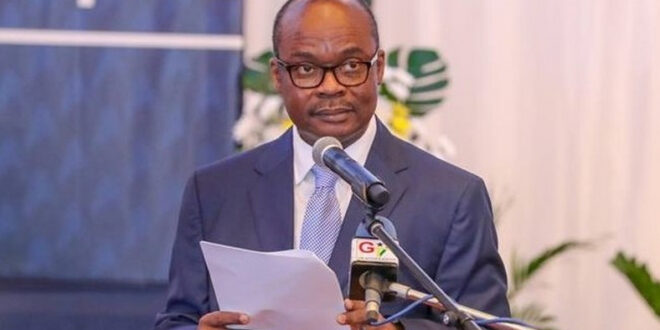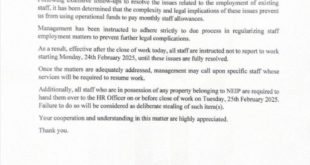A legal practitioner has petitioned the Attorney-General (A-G) to prosecute the Governor of the Bank of Ghana (BoG) and other top officials of the bank over the sharp fall in the value of the Ghana cedi.
Dr John E. Baiden is urging the A-G to go behind the BoG over what is known in law as “lifting the corporate veil’’ and hold the top officials of the central bank responsible for the woes of the cedi that have affected the general economy and individuals.
He wrote the petition under the auspices of the Liberty Institute Law firm, a firm he founded that seeks to advocate justice and liberty in the country.
Dr Baiden’s contention was that the BoG had failed in its mandate to stabilise the cedi, as stipulated by Article 183 (2) (a) of the 1992 Constitution and Section 4(b) of the Bank of Ghana Act, 2002 (Act 612).
Cedi compromised
According to the petitioner, the BoG had compromised the Ghana cedi.
“It is out of line and must be brought back in line, as our laws demand,” the petition stated.
The petitioner expressed the hope that the A-G would explore the probable cause of the decline in value of the national currency and “initiate prosecution against those behind the BoG corporate veil for the unlawful damage they have caused to our cedi — earned, gifted, invested and saved”.
“Hopefully, prosecution will bring about conscientiousness and deterrence. Unstable currency equals unstable country. Ghana can do better,” Dr Baiden averred.
The petition was dated May 5, 2022 and copied to the President, the Speaker of Parliament, the Minister of Finance and the BoG.
Hardships
Dr Baiden was of the view that the interbank-exchange of the cedi to the dollar, which was more than GH¢7.61 (as of the time he issued the petition), had resulted in astronomical increases in the prices of all essential items such as food, fuel, utilities and transport fares, which had led to untold hardship and misery in the country.
“The cedi depreciation is not abating; putting the entire population in a panic mode because general incomes and salaries are stagnant, unchanged and, for some, worsening due to the present adverse economic conditions and a result of the unstable cedi,” the petition stated.
Management of cedi
It further indicated that the current hardship as a result of the depreciation in the cedi’s value had been made worse by the BoG’s inability to put in place policies and systems to properly manage the currency.
It said since 1992, the BoG had employed a system known as the “free floating exchange” to manage the cedi against other currencies, which was based on the demand and the supply of foreign currencies.
The system, it noted, was best employed if a central bank had substantial reserves of foreign currency to intervene whenever demand outstripped supply to reduce the pressure on the local currency.
Lack of reserves
According to the petition, the BoG lacked the reserves to make any substantial impact to stabilise the cedi in the event demand outstripped the supply of a foreign currency, especially the US dollar, which had been the phenomenon for many years.
“The BoG cannot continuously employ a floating exchange rate regime to manage the Ghanaian cedi when it knows that it lacks the requisite reserves to effectively intervene on the market to give the cedi a stable value. The BoG’s inability to manage the floating rate regime puts the Ghana cedi in perpetual flux,” it added.
The best option to manage the cedi, it explained, was for the BoG to move away from the free floating regime and adopt “the law of one price’’ or the purchasing power theory, which allows a country to peg its currency to that of a foreign country, such as the dollar.
“In pursuing our monetary sovereignty, there is nothing that prevents us from rolling back or resetting our currency with the US dollar. An exchange rate roll back to July 2017 or 1:1 ratio is a ‘status quo ante’ or restitution,’’ the petition said.
Source: Graphic

Send your news stories to myghanamedia@gmail.com and Chat with us via WhatsApp on +233 200818719
 MYGHANAMEDIA.COM Best Source Of Latest News
MYGHANAMEDIA.COM Best Source Of Latest News




